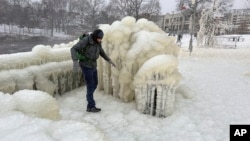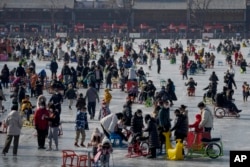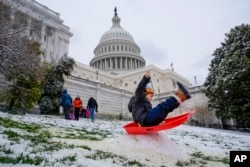And now, Words and Their Stories, from VOA Learning English.
On this program, we explore words and expressions in the English language. We give definitions, examples, notes on usage, and sometimes we use them in short conversations.
In a recent science report we explained about a weather system called the polar vortex. It caused a snowball effect on extreme weather around the world. The event led to record-high temperatures in many parts of the world. But much of North America had to deal with extreme cold. Some areas recorded temperatures as low as minus 20 degrees Celsius.
In an earlier Words and Their Stories program, we explained how to use the expression snowball effect to describe a situation where one action or event causes many other similar actions or events.
Are you thinking that there must be many more English expressions related to snow, ice, and cold weather? You are right! The term “snowball effect” is just the tip of the iceberg!
Or, to put it another way, we have many more expressions in American English related to the cold weather. So, today we will explore some winter words and expressions.
In the dead of winter, many people like to skate on frozen lakes. But watch out! You don’t want to skate on thin ice. That is dangerous. If it breaks you could fall into the cold, dark water below. You could even drown.
So, the expression skating on thin ice serves as a warning. For example, if a friend is always late to work, you might tell him he is skating on thin ice with his employer.
But, you might not want to say anything to your friend. Maybe it is none of your business when your friend arrives at work. So, you decide to put your warning on ice.
To put something on ice means to suspend action on something – a temporary halt. In fact, today a co-worker asked me to put my project on ice, so I would have time to help her with today’s lesson.
When we put food on ice we preserve its quality for a time. We can wait to eat it later and it will still be good.
What about when we break the ice, though? That sounds dangerous, right? However, it just means reaching out personally to a stranger. Like in this example:
A: Hi Matt. Have you met our new teacher, Jennifer?
B: No. Not yet.
A: Why don’t you break the ice and introduce yourself this afternoon?
B: I certainly will.
Ice is not all we might face in winter. Sometimes the snow is so deep we cannot even get out of the house. At those times, you might say there is a snowball’s chance in hell I’m leaving home today.
Hell is fiery and extremely hot. A snowball has no chance at survival there. So, the expression describes something that is impossible.
Now that we are stuck inside the house, we say we are snowbound or snowed under. And we often use snowed under to describe a situation in which we have too much work to do.
American children usually love a snow day! That phrase is used to mean schools are closed. Students might spend the day outdoors throwing snowballs or building a snowman. Or maybe they stay inside, covered up in a warm blanket next to a hot fire, snug as a bug in a rug.
We use the expression snug as a bug in a rug to describe a soft, warm and safe position or situation.
Sounds like a great place to be, especially during a snow storm. I mean, no one wants to be left out in the cold. That can really hurt, physically and emotionally!
Sometimes we use this phrase, left out in the cold, when someone has rejected or forgotten us.
We will never leave English learners out in the cold, to be sure! Especially not in the dead of winter!
And that’s Words and Their Stories.
I’m Caty Weaver.
Hai Do wrote this lesson for VOA Learning English.
__________________________________________________
Words in This Story
preserve - v. to keep something in its original state or in good condition
introduce - v. to make someone known to someone else








Forum